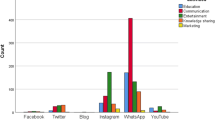Abstract
The study was undertaken to investigate the effect of WhatsApp on the academic performance of Mass Communication education students. Four research questions were raised to guide the study. The study employed descriptive research design. The population of the study comprised of 275 Mass Communication education students were randomly selected and used as sample for the study. The instrument that was used for the study was a set of structured questionnaires which were validated by the supervisor and one other expert. The results indicated that there is no significant influence of frequency of WhatsApp usage on the academic purposes of this usage, also there is significant influence of the rate of WhatsApp usage on the academic purposes of this usage, and there is significant influence of topics that students communicate through WhatsApp and the academic purposes of this usage and there is no significant influence of patterns of WhatsApp usage on the academic purposes of this usage.
Access this chapter
Tax calculation will be finalised at checkout
Purchases are for personal use only
Similar content being viewed by others
References
Veena G, Lokesha M (2016) The effect of whatsapp messenger usage among students in Mangalore university: a case study. Int J Library Inf Stud 6(2):122
Gon S, Rawekar A (2017) Effectivity of E-learning through WhatsApp as a teaching learning tool. MVP J Med Sci 4(1):19–20
54 million internet users in Bahrain. https://alwatannews.net/article/815542/Bahrain/154-%D9%85%D9%84%D9%8A%D9%88%D9%86-%D9%85%D8%B3%D8%AA%D8%AE%D8%AF%D9%85-%D9%84%D9%84%D8%A5%D9%86%D8%AA%D8%B1%D9%86%D8%AA-%D9%81%D9%8A-%D8%A7%D9%84%D8%A8%D8%AD%D8%B1%D9%8A%D9%86. Accessed 12 Dec 2019
Statistics of social media in Saudi Arabia 2018. https://emarketing.sa/%D8%A7%D8%AD%D8%B5%D8%A7%D8%A6%D9%8A%D8%A7%D8%AA-%D9%88%D8%B3%D8%A7%D8%A6%D9%84-%D8%A7%D9%84%D8%AA%D9%88%D8%A7%D8%B5%D9%84-%D8%A7%D9%84%D8%A7%D8%AC%D8%AA%D9%85%D8%A7%D8%B9%D9%8A-%D9%81%D9%8A-%D8%A7/. Accessed 12 Dec 2019
Gallardo Echenique EE (2014) An investigation of the social and academic uses of digital technology by university students, Un-Published Ph.D dissertation, Universitat Rovira i Virgili, Department of Pedagogy, p 33
Mohammad I, Sonali D (2019) Impact of WhatsApp messenger on the university level students: a psychological study. Int J Res Analyt Rev (IJRAR) 6(1):572–586
Singh NM (2019) Role of WhatsApp in improving learning among medical students. Int J Med Sci Public Health 8(2):165–168
Çam AB, Yafes C (2019) The effect of “Whatsapp” usage on the attitudes of students toward english self-efficacy and English courses in foreign language education outside the school. Int Electron J 11(3):247–256
Francesc F-GJ, Joaquín M-P, Pedro M-B, Marc P-L (2019) Uses of WhatsApp in the Spanish university student. Pros Cons Revista Latina de Comunicación Social 74:308–324
Chinwe IE, Ngozi AC (2018) WhatsApp at tertiary education institutions in Nigeria: the dichotomy of academic disruption or academic performance enhancer? J Pan Afr Stud 12(2):179–205
Levent C (2018) The impact of Whatsapp use on success in education process. Int Rev Res Open Distrib Learn 18(7):59–74
Sandra EA, Nkeiruka QN (2018) WhatsApp utilization and academic performance of computerin education trainee teachers in University of Port-Harcourt. Int J Educ Learn Develop 6(5):15–25
Bataineh RF, Baniabdelrahman AA, Khalaf KMB (2018) The effect of e-mail and WhatsApp on Jordanian EFL learners’ paraphrasing and summarizing skills. Int J Educ Develop Inf Commun Technol (IJEDICT) 14(3):131–148
Hananel R, Asterhan SC (2018) “Whatsapp, Teacher?” - student perspectives on teacher-student WhatsApp interactions in secondary schools. J Inf Technol Educ Res 17:205–226
Gasaymeh A-MM (2017) University students’ use of WhatsApp and their perceptions regarding its possible integration into their education.Global J Comput Sci Technol G Interdisc 17(1):1–11. Version 1.0
Andújar A, Cruz-Martínez M-S (2017) Mobile instant messaging: WhatsApp and its potential to develop oral skills. Media Educ Res J 25(50):43–52
Zahoor H, Rameez M, RazaHussain S, Ahmed MN (2017) WhatsApp usage frequency by university students: a case study of Sindh University. Eng Sci Technol Int Res J 1(4):15–20. DEC
Kumar MD, Sonia B (2017) Magnetism of WhatsApp among veterinary students. Electron Library 35(6):1259–1267
Kufre Akpan P, Ezinne A (2017) Effectiveness of WhatsApp as a collaborative tool for learning among undergraduate students in university of Uyo, Akwa Ibom state. Int J Adv Educ Res 2(5):43–46
Sonia G, Alka R (2017) Effectivity of E-Learning through WhatsApp as a teaching learning tool. MVP J Med Sci 4(1):19–25
Bhatt A, Arshad M (2016) Impact of WhatsApp on youth: a sociological study. IRA Int J Manage Soc Sci 4(2):376–386
Sarker Md, Rabbani G (2015) Impact of WhatsApp messenger on the university level students: a sociological study. Int J Natural Soc Sci 2(4):118–125
Al-Sartawi A (2020) Social media disclosure of intellectual capital and firm value. Int J Learn Intell Capital 17(4):312–323
Musleh Al-Sartawi AMA (2020) E-learning improves accounting education: case of the higher education sector of Bahrain. In: Themistocleous M, Papadaki M, Kamal MM (eds.) Information systems. EMCIS 2020. Lecture Notes in Business Information Processing, vol 402. Springer, Cham
Solomon Tawiah Y, Emmanuel AA, Nondzor H (2014) Usage of WhatsApp and voice calls (Phone call): preference of polytechnic students in Ghana. Sci J Bus Manage 2(4):103–108
Hussain Z, Mahesar R, Shah RH, Memon NA (2017) WhatsApp usage frequency by university students: a case study of Sindh University. Op. Cit 16
Chinwe IE, Ngozi AC (2018) WhatsApp at tertiary education institutions in Nigeria: the dichotomy of academic disruption or academic performance enhancer, Op. Cit. 188
Memdani L (2020) Demonetisation: a move towards cashless economy in India. Int J Electron Bank 2(3):205–211
Author information
Authors and Affiliations
Editor information
Editors and Affiliations
Rights and permissions
Copyright information
© 2021 The Author(s), under exclusive license to Springer Nature Switzerland AG
About this chapter
Cite this chapter
Hassan, A., Elrahman, M.G.S.A., Ahmed, E.M.H., Elmatboly, D.I., ALhomoud, K.I. (2021). The Usage of Social Media for Academic Purposes. In: Musleh Al-Sartawi, A.M.A. (eds) The Big Data-Driven Digital Economy: Artificial and Computational Intelligence. Studies in Computational Intelligence, vol 974. Springer, Cham. https://doi.org/10.1007/978-3-030-73057-4_28
Download citation
DOI: https://doi.org/10.1007/978-3-030-73057-4_28
Published:
Publisher Name: Springer, Cham
Print ISBN: 978-3-030-73056-7
Online ISBN: 978-3-030-73057-4
eBook Packages: Intelligent Technologies and RoboticsIntelligent Technologies and Robotics (R0)




